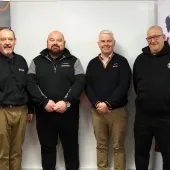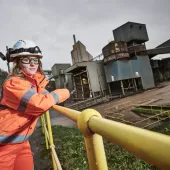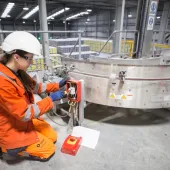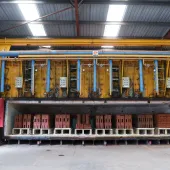Leading by example at Forterra

Female engineering graduate Nia Lewis challenges the status quo in manufacturing
ACCORDING to WISE, the campaign for gender balance in science, technology, engineering and mathematics (STEM), women represented 22% of the core STEM workforce in 2018. On closer examination, just 8% of skilled tradespeople were female, alongside 12% of engineering professionals, and women made up a mere 13% of STEM managers.
Against this professional backdrop, a determined operations management trainee on Forterra’s graduate programme is calling for more to be done – at school, university and industry level – to increase awareness among girls and women of the career opportunities available in construction, manufacturing and engineering.
Twenty-two-year-old Nia Lewis joined Forterra’s Quality team at the end of 2019 on the company’s two-year Operations Management graduate scheme, which includes an integrated leadership management qualification. She had recently graduated with a 2:1 BEng in Civil Engineering from the University of Sheffield, where she was one of only a handful of women on her course.
Now approaching the end of her first secondment at Forterra’s Hams Hall plant in the West Midlands and Newbury factory in Berkshire, Ms Lewis (pictured) has been providing quality assurance for a project concerning the assembly of wires used to cut the Thermalite aircrete blocks manufactured at both sites.
‘It’s fascinating to be learning the technical elements of the manufacturing process first-hand,’ she said, ‘especially given the range of products, systems and processes across Forterra’s divisions.’
Speaking about her motivations for joining Forterra, Ms Lewis explained how accommodating she’s found the company’s staff since the graduates’ assessment day, where she was immediately put at ease.
‘I’ve encountered some surprise here relating to my gender, yet consistently friendly and helpful attitudes throughout the business – and what’s especially positive is that, during the application process, I found management as a whole really keen to recruit a woman,’ she said.
Ms Lewis cites her school, Moreton Hall, as a major influence on her decision to pursue engineering, and later manufacturing, as potential career paths. ‘It was a very empowering place – we had careers conventions with visiting industry representatives, as well as weekly STEM talks.
‘I met one female structural engineer who was so passionate about her role that it inspired me to consider engineering as a field. At university, too, we were fortunate enough to have talks from women in engineering.
‘While there are increasing efforts from industry bodies and individual employers to get more women into STEM careers, the key is ensuring that girls are aware from an earlier age that positions in these sectors exist in the first place. In time, I predict it will be seen as increasingly ‘normal’ for women to join STEM industries – but perhaps commercial construction will see more women than manufacturing initially.’
Ms Lewis’s next secondment will be to Bison Precast, Forterra’s Derbyshire-based concrete division, where she will embark on installing a new quality-assurance process for the manufacture of Bison’s leading Hollowcore floor product. Working sustainably by examining ways to re-use certain waste materials will also form part of her focus.
‘I’d like to stay in operations after completing the graduate scheme – hopefully I’ll be able to move into a role that relates to sustainability,’ she said. ‘Ultimately, my main priority is to be happy in my job.’
Asked what her advice would be for girls or women contemplating a career in a male-dominated sector, she responded: ‘Don’t feel siloed into a certain industry by your gender and don’t stick with the status quo. Take the jump: approach a company and ask for some experience, or reach out to a female employee for advice – there’s usually at least one woman in every company!’
James Jeffcott, Forterra’s technical operations manager and Ms Lewis’s line manager, said: ‘Nia is a positive, intuitive and highly capable addition to the management team, currently working within my Quality department as part of our graduate programme.
‘We are very much looking forward to seeing her develop over the next two years in terms of her management, leadership skills and technical knowledge.
‘As a company we are always on the lookout for talented, highly knowledgeable staff, regardless of gender or other demographics, who can help us to develop and refine cutting-edge products and systems to keep Britain building.’









